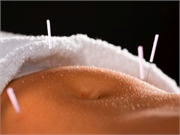Patients receiving true acupuncture have significantly lower least square mean xerostomia score
TUESDAY, Dec. 10, 2019 (HealthDay News) — Acupuncture results in significantly fewer and less severe symptoms of radiation-induced xerostomia (RIX) among patients with oropharyngeal or nasopharyngeal carcinoma, according to a study published online Dec. 6 in JAMA Network Open.
M. Kay Garcia, Dr.P.H., from the University of Texas MD Anderson Cancer Center in Houston, and colleagues conducted a phase 3 two-center randomized clinical trial to compare a standard care control (SCC; 112 patients) to true acupuncture (TA; 112 patients) and sham acupuncture (SA; 115 patients) among patients with oropharyngeal or nasopharyngeal carcinoma who were undergoing radiation therapy.
The researchers found that the adjusted least square mean xerostomia score was 26.6 in the TA group, which was significantly lower than in the SCC group (34.8; P = 0.001) and slightly lower but not statistically significantly different from the SA group (31.3; P = 0.06). A similar pattern was seen in the incidence of clinically significant xerostomia one year after radiation therapy ended, with 34.6, 47.8, and 55.1 percent of patients in the TA, SA, and SCC groups, respectively, experiencing clinically significant xerostomia (P = 0.009). A significant difference between the TA and SCC groups occurred at both institutions in post-hoc comparisons.
“On the basis of these findings, acupuncture may be considered an adjunct to standard care for patients who are interested in receiving acupuncture and at risk of developing RIX,” the authors write.
One author disclosed financial ties to Merck.
Copyright © 2019 HealthDay. All rights reserved.








